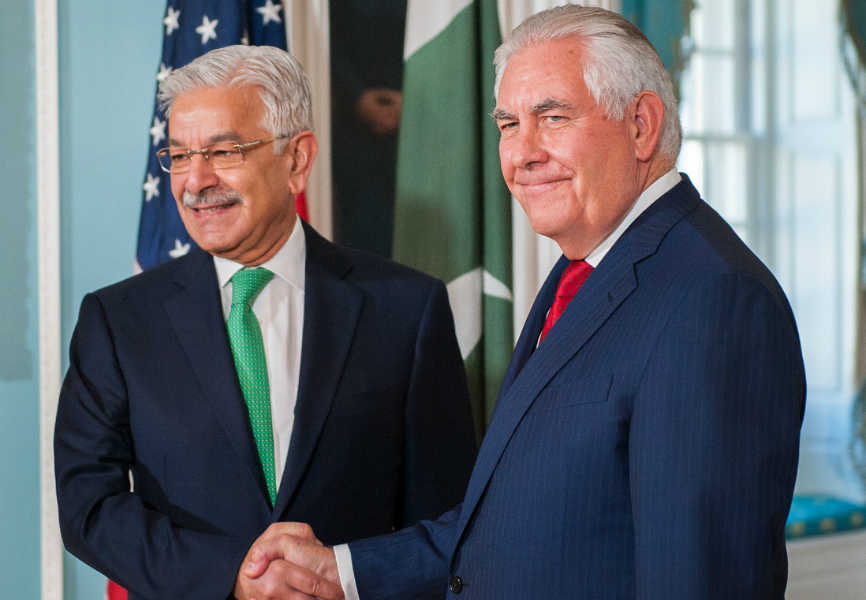The Donald Trump White House has pursued numerous controversial and consequential foreign policies, not least of which is his administration's new South Asia policy. Washington has been particularly incensed by Pakistan's continued sponsorship of certain militant groups, and its failure to end the practice of distinguishing between “good” and “bad” terrorists; the former being outfits that target India.
For Trump, part of this pivot is driven by concern over such attacks on India, particularly given the US president's close relationship with Prime Minister Narendra Modi and a broader interest across the US government to deepen the partnership between the two countries.
However, the bigger reason for the pivot is the threat terrorists pose to US troops in the region – and a view that Pakistan has delivered little cooperation after receiving billions of dollars in US aid. Trump is not the first to voice these concerns; the past two US administrations also noted their frustrations with Pakistan's often duplicitous approach. What's different is Trump's bombastic public comments coupled with follow-through on a pledge to end financial aid.
Trump's new approach has drawn criticism in many quarters. Some argue that by turning its back on Islamabad now, the US will create a vacuum for China to fill. Accordingly, prominent foreign policy hands are advocating that Trump instead double down on engagement to block China's inroads and pull Pakistan even closer to coerce behavioral change.
By no means am I advocating Trump's policies, however the problem with the aforementioned school of thought is that this is exactly what Washington has done for nearly forty years. Every time Pakistan's perfidy percolates, US administrations confront a decision to either hold Islamabad accountable by tightening the screws, or give it a stern talking to and return to business as usual. Time and again, Washington has opted for the latter. Pakistan continues to support terrorists, and a few years later, the same debate starts up again.
It is true that US retrenchment will only encourage China's courtship of Pakistan. Nonetheless, those arguing that as a consequence the US should stay the course are ignoring the structural and historical factors that drive Pakistan to seek out foreign support. And these factors show that regardless of what the US does, Pakistan will move closer to China.
In contrast to its neighbor India, which has long promoted non-alignment and an independent foreign policy – an ideological pursuit that faced numerous shortcomings in its own right – Pakistan sought an external patron post-independence.
Out of a desire to remain competitive with New Delhi, Islamabad turned to Washington to promote its interest. Over the years, this resulted in mutual cooperation, with Pakistan promoting US interests in the region and the US supporting a balance of power in South Asia, preventing India from obtaining a military edge. The US also provided Pakistan with financial support, weapons, and diplomatic backing.
India's economic rise has changed this dynamic. The US now has a natural interest in building India as a regional power, in part to counter China, and has advanced the US-India strategic partnership and furnished New Delhi with the latest defense technology. This, however, opposes Pakistan's push for a power balance, and limits Washington's ability to aid Pakistan as it did in earlier years. Accordingly, the utility of the US as patron has waned.
Instead, over the past few years, China has emerged the new benefactor and will remain so for the foreseeable for future.
Why is this change irreversible? Ask yourself the following: Will the US give Pakistan a USD 60 billion development package – essentially a personalized Marshall Plan 2.0? Will it provide uncompromising support for Pakistan on the global stage, including a willingness to rebuff efforts by the United Nations (on India's behalf) to designate Pakistan-based jihadist chief Masood Azhar a terrorist? Will it risk confrontation with India to further promote a balance of power in the region?
The answer to all of the above is no.
The US simply, and logically, will not accede. However, China has been willing to do just this, as these actions directly strengthen its own regional interests. Ultimately, China, unlike the US, is willing to bring India down a peg, which is the biggest priority for Islamabad. From China's perspective, building a stronger Pakistan that can weigh down India will reduce the scope of New Delhi threatening Beijing. Furthermore, if India does go to war, China can engage on two fronts by leveraging Pakistani assets.
Over the years Washington and Islamabad's policies towards India have gone from coexistence to diametric opposition whereas China's interests have perfectly intersected with Pakistan's.
Thus, there is no level of engagement the US can offer that will encourage Pakistan to change its behavior. In the minds of Pakistani policy makers, they have a new patron. The vacuum has already been filled with a partner that is willing to do more for Islamabad than the US ever was – losing the US is of little consequence to Pakistan's grander goals.
Accordingly, US policy makers should shelve the argument that backing away from Pakistan will encourage China to move in. Officials should instead focus on policies and tactics that can contain the spread of terror groups, even if further sours relations with Pakistan. The US has already lost Islamabad to Beijing's orbit – and there is nothing Washington can do to reverse it.

 U.S. Secretary of State Rex Tillerson meets with Pakistani Foreign Minister Khawaja Muhammad Asif at the U.S. Department of State in Washington, D.C. on October 4, 2017. [State Department Photo/ Public Domain]
U.S. Secretary of State Rex Tillerson meets with Pakistani Foreign Minister Khawaja Muhammad Asif at the U.S. Department of State in Washington, D.C. on October 4, 2017. [State Department Photo/ Public Domain]